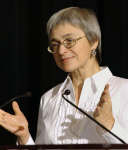 Educated people like to flex their mental muscle so that others around them can see how wonderfully smart they are. One of the best ways to prove your worth (and silence others) is to quote stuff, preferably in Latin, or in ancient Greek.
Educated people like to flex their mental muscle so that others around them can see how wonderfully smart they are. One of the best ways to prove your worth (and silence others) is to quote stuff, preferably in Latin, or in ancient Greek.
I remember a cartoon by the late Kari Suomalainen, The Political Cartoonist of his days, where he criticised the show-off yuppies for toting their mobile phones in public in order to look cool. This was at the time when they were so expensive and huge that only the rich could afford them and only the strong could carry them. In the cartoon he says: small bosses show off their mobile phones so that people would think they are big and important. But big bosses don't have mobile phones, they have secretaries. Spot on.
And, there's also an inverse relationship between the size of your briefcase and your status. The smaller the case, the more important you are, as you have someone else to carry all the files for you, while you only need the case for the actual contract. Or, if you are important enough, like the Queen, you only have a small handbag and never have to carry anything else.
And it goes with the education and upbringing and enculturation as well. If you have something really important to say, you don't need to shout. If you are smart enough, people will notice it without you telling them, and there's no need to try to make others look stupid so that you could stand out as the smartest. Actually, truly wise people make other people in their presence feel smart, not dumb.
I'm not sure where I'm heading with this. I think I wanted to say that there are different ways in which you can try to change the world. You could climb the ladder of power, use sharp elbows and in general silence everyone who doesn't agree with you. You make "your way" the only way, and make sure that those who don't recognise your wisdom will feel stupid. This is the zero-sum game of life: if you have something, other's can't have it. Therefore you must take it from them in order to get it. The have's and have not's.
Or, if you believe in added value instead of the zero-sum, you can try to inform people, get them to make up their own mind, equip them to analyse and come to their own conclusions. If what you are doing is smart, they will see that and support you. Or if they don't agree, you can learn from them, because you might be doing something wrong. Says the idealist.
Whether it is democracy or science, openness and acceptance of other people's opinions is vital. You can not advance either of the two unless there is some sort of a core of values, a method for discussing competing evidence, a method that ensures transparency and at the end of the day accountability. Drawing analogies between how society and science work is an old hobby of philosophers, Thomas Kuhn's writing's about the structure of scientific revolutions is possibly the best known for us. But, you could also say that one could not survive without the other, and either can survive for long unless they both subscribe to the principles of openness, transparency and accountability; the method being simply the freedom of speech.
The freedom of speech is the sine qua non of both democratic societies and progressive scientific communities. There's my latin quote. It was the one thing that came to my otherwise empty mind when I, in disbelief, read the sad news. Anna Politkovskaya was one of those writers whose stories are so important that they have a need to be heard. And now, they will be heard even louder. Every loudspeaker is made of a vibrating element and a resonating box. A coffin as a loudspeaker; it is so very sad but also true.
Her torch will hopeufully be picked up and carried on. Without Anna Politkovskaya and her stories there is no Russia.
Sunday, October 08, 2006
Sine qua non
Subscribe to:
Post Comments (Atom)

No comments:
Post a Comment